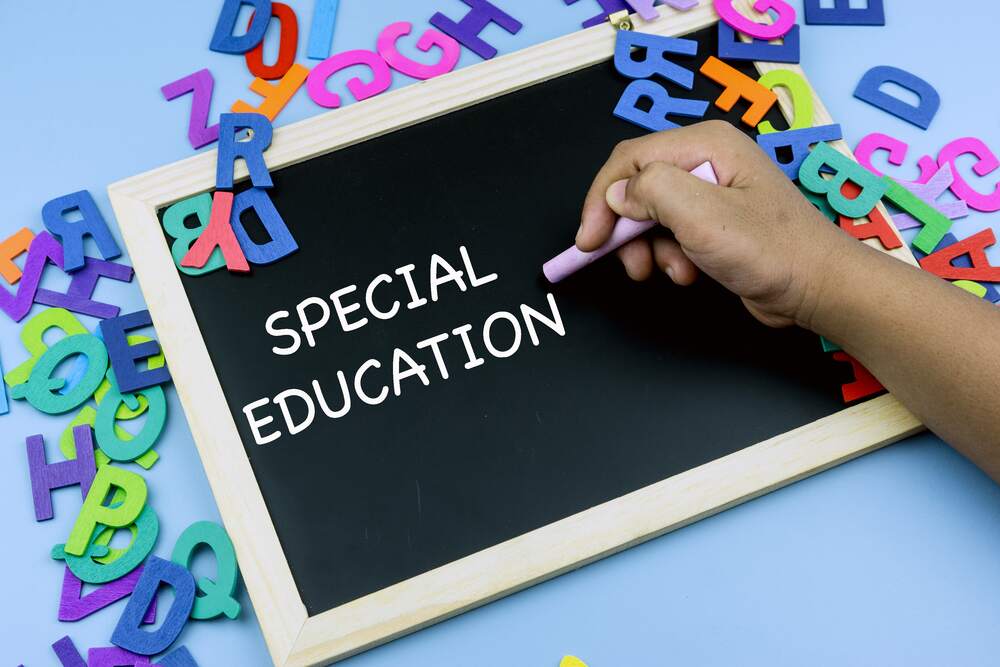
Being a special education teacher is hard work, but it’s oh so worth it! they have very rewarding careers. They get to use their skills to help children with disabilities. In creating lesson plans, assisting students in the classroom, and working with parents, you are able to use your incredible skills to help children with disabilities. Additionally, this career path boasts a positive job outlook of 3% and a median salary of over $61,000 per year. Not to mention flexibility to work in public or private schools, vocational settings, or in a residential setting.
Sounds amazing, right? If you’re ready to become a special education teacher, the guide below will provide a complete overview of how to make it happen. Just keep in mind that requirements vary depending on where you live and what qualifications you already have.
Check Out Our Available Special Education Teacher Jobs
1. Complete an Approved Teacher Preparation Program
As part of your preparation program, you’ll work towards your bachelor’s degree in special education while gaining hands-on experience. During this time you’ll probably choose either a primary or secondary concentration. Primary concentrations are for those who want to work with students K-6 students. Secondary concentrations are for those who would like to work with older students.
Your undergraduate degree may be a Bachelor of Arts (BA) or Bachelor of Science (BS). Regardless, it will require you to take around 120 credit hours consisting of core education theory, pedagogy courses, and special education courses. Examples of required core classes include:
- The Inclusive Classroom
- Teaching Students with Special Needs
- Differentiating Instruction
- Language Acquisition
- Children with Exceptionalities
- Foundation Literacy Skills and Phonics
- Disability, Education, and Public Policy
Additional coursework will depend on what grade level you want to teach:
- If you want to teach primary students (K-6), your courses will cover general education for multiple subjects.
- If you want to teach secondary students, your courses will focus on a specific subject, such as English, math, or science. In this case, you will teach the subject to general population students as well as students with disabilities. This means you can work in inclusive classrooms, or in classrooms exclusive to students with disabilities.
Depending on the program, you may be required to, or have the option of choosing a specialization. Examples of specializations include:
- Students With Mild/Moderate Disabilities
- Students With Severe Disabilities
- Birth to Age 5
By declaring a specialization your education can be more focused, allowing you to develop skills to help a specific group of students.
By the time your teacher prep program is complete, you can expect to accomplish the following:
Bachelor’s Degree
A bachelor’s degree in special education will prepare you for a variety of situations that you’ll encounter as a special education teacher. You’ll learn how to:
- Implement Individualized Education Programs (IEPs)
- Work one-on-one with students with disabilities
- Work in a classroom exclusive to students with disabilities
- Work with disabled students in general classroom settings
Hands-on Experience
While working towards your bachelor’s degree, you will also get super important, hands-on experience.
This usually involves working in a real classroom, where a teacher mentor will guide and supervise you. You will help them create lesson plans, teach students, assess work, and work with parents. In most cases, you’ll be required to complete 1-2 semesters of this teaching experience. However, the requirements may vary depending on what program you’re in or where you live.
While gaining your hands-on experience, be sure it is completed at an approved school, which counts toward your prep program. And of course, log your hours properly.
Finding the Right Prep Program
There are SO many preparation programs out there, it can be overwhelming. To find one in your state, check the CAEP’s website.
The Council for the Accreditation of Teacher Preparation (CAEP) was formed in 2013 when The Education Accreditation Council (TEAC) and National Council for Accreditation of Teacher Education (NCATE) joined together. By choosing a CAEP-approved program, you can rest knowing that it is accredited and will properly prepare you for your career.
2. Pass the Required State Exams
You will need to pass the required exams to be a special education teacher. Every state has its own testing requirements, so be sure to check with your state’s board of education to learn their testing requirements. It’s likely that will involve multiple assessments, surpassing those needed to become a general education teacher.
Many states use the Praxis series to test you on fundamental special education skills and your ability to apply them in real-world settings. They include:
- Special Education: Core Knowledge and Applications
- Special Education: Preschool/ Early Childhood
- Interdisciplinary Early Childhood Education
Other required exams may include:
- The Foundations of Reading Test
- A pedagogy assessment
- Praxis exam specific to your subject (This is applicable if you want to become a secondary special education teacher. For instance, if you want to teach math to high school students with disabilities, you will likely need to take the Praxis Core Math Test.)
Ideally, you should pass these exams the first time around. This will prevent any delays with your licensure, and avoid multiple exam fees.
3. Apply for State License
If you plan on working at a private school, you may not be required to hold a state license. But, as a special education teacher, this is an important step to show you are a qualified professional, and is a must for working in public schools.
As with testing requirements, each state sets its own standards for licensure. However, most states will require the following:
Bachelor’s Degree
Most states will require you to have a bachelor’s degree in special education. But, if you have a bachelor’s degree in something other than special education, you may still be able to become a special education teacher. The process will just require extra steps (see step 4 below).
Teaching Experience
You’ll need to show documentation of the student teaching experience we mentioned above. Most states require 1 to 2 semesters of experience.
Pass the Required Exams
As we discussed earlier, you’ll need to pass your state’s required exams. This will demonstrate that you have what it takes to succeed in this career.
Background Check
Background checks are a typical part of the process. A background check will verify your identity, employment history, and criminal record.
4. Pursue a Graduate Degree in Special Education
Pursuing a graduate degree in special education is a smart choice for many professionals. It can increase your salary potential and job opportunities. You may also want to consider a graduate degree in special education if:
- Your state requires a master’s degree to become licensed
- You want to specialize in a specific area of special education
- You want to pursue an administrative position in special education
- You are a licensed teacher but want to make the switch to special education
- You have a bachelor’s degree in another field of study but want to become a licensed special education teacher
Graduate degrees you can pursue include:
Master of Arts in Teaching (M.A.T.)
Do you have an academic degree in something other than teaching? A M.A.T. will be a good route. It will allow you to pursue a career as a special education teacher. It’s also a common choice for general education teachers who want to go into special education.
Master of Arts in Education (MAEd)/ Master of Science in Education (MSed)
This degree is very flexible and suitable for teachers who are already licensed. It allows you to choose from a wide selection of specializations and concentrations. With it you can pursue advanced positions and do research.
Master of Education (MEd)
This degree is best for professionals who are already certified and have lots of experience in special education. It allows you to further develop your skills in a particular specialization.
Examples of MEd programs include:
- High Incidence. In this program, you’ll learn how to work with students with learning disabilities, behavior disorders, etc.
- Severe Disabilities. This program is for teachers who want to work with students with severe intellectual disabilities, autism spectrum disorders, etc.
- Visual Disabilities. You’ll learn how to work with students with visual impairments.
The bottom line on how to become a special education teacher
Learning how to become a special ed teacher is the easy part. Having the dedication and desire to take on this career takes something exceptional! If you have what it takes, get started with your preparation program and get ready to work hard. Your rewards will be great!



